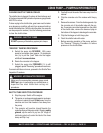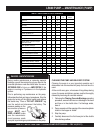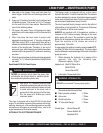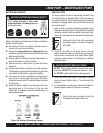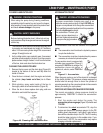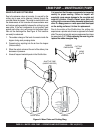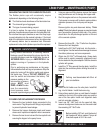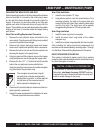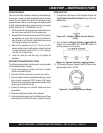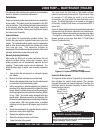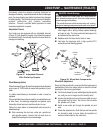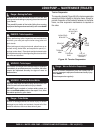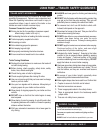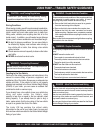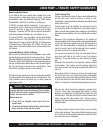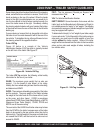
MAYCO LS600 PUMP — OPERATION AND PARTS MANUAL — REV. #4 (9/15/11) — PAGE 43
LS600 PUMP — MAINTENANCE (PUMP)
WHEEL BEARINGS
After every 6 months of operation inspect the wheel bearings.
Once a year, or when required, disassemble the wheel hubs
remove the old grease and repack the bearings forcing
grease between rollers, cone and cage with a good grade
of high speed wheel bearing greases (never use grease
heavier than 265 A.S.T.M. penetration “No. 2.”).
1. Fill the wheel hub with grease to the inside diameter of
the outer races and also fill the hub grease cap.
2. Reassemble the hub and mount the wheel. Then tighten
the adjusting nut, at the same time turn the wheel in
both directions, until there is a slight bind to be sure all
the bearing surfaces are in contact.
3. Back off the adjusting nut 1/6
to 1/4 turn or to the
nearest locking hole or sufficiently to allow the wheel
to rotate freely within limits of .001” to .010” end play.
Lock the nut at this position.
4. Install the cotter pin and dust cap, and tighten all
hardware.
EXTENDED STORAGE INSTRUCTIONS
The following preventative maintenance is recommended
for extended periods of storage.
1. Check brake system for proper fluid level in master
cylinder and bleed all lines.
2. Lubricate all links and pivots to prevent any rusting.
3. Remove wheel and drum assemblies and spray a good
anti-corrosion compound (CRC formula 5-56) under
rubber boot on forward end of brake wheel cylinder. Avoid
spraying drum and brake lining.
4. Grease all bearings and reinstall wheel and drum
assemblies.
5. Make sure breakaway cable is fully released.
6. After extended storage, refer to the Maintenance Steps
listed above to insure that the trailer is ready for towing.
PRESSURE TEST
1. To determine the pressure of the Hydraulic System, set
the
Cylinder Stroke Control Switch
(Figure 42) to the
JOG position.
2. Turn and hold the Manual Cylinder Jogging Switch
(Figure 43) to either JOG “A” or JOG “B” position to
test the pressure of that cylinder.
13. The Pumping Pressure Gauge (Figure 44) should read
approximately 4400 ± 50 PSI.
Figure 42. Cylinder Stroke Control Switch
(JOG)
Figure 43. Manual Cylinder Jogging Switch
Figure 44. Pumping Pressure Gauge



